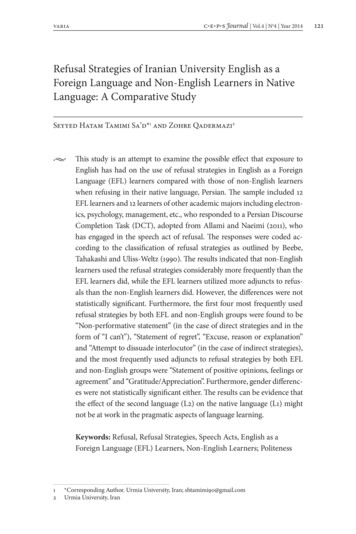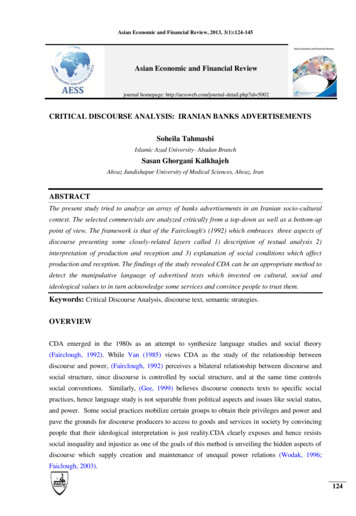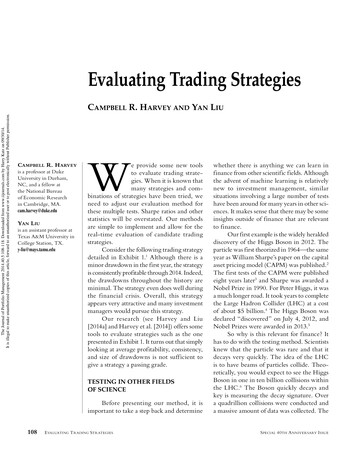
Transcription
variac e p s Journal Vol.4 No4 Year 2014Refusal Strategies of Iranian University English as aForeign Language and Non-English Learners in NativeLanguage: A Comparative StudySeyyed Hatam Tamimi Sa’d*1 and Zohre Qadermazi2 This study is an attempt to examine the possible effect that exposure toEnglish has had on the use of refusal strategies in English as a ForeignLanguage (EFL) learners compared with those of non-English learnerswhen refusing in their native language, Persian. The sample included 12EFL learners and 12 learners of other academic majors including electronics, psychology, management, etc., who responded to a Persian DiscourseCompletion Task (DCT), adopted from Allami and Naeimi (2011), whohas engaged in the speech act of refusal. The responses were coded according to the classification of refusal strategies as outlined by Beebe,Tahakashi and Uliss-Weltz (1990). The results indicated that non-Englishlearners used the refusal strategies considerably more frequently than theEFL learners did, while the EFL learners utilized more adjuncts to refusals than the non-English learners did. However, the differences were notstatistically significant. Furthermore, the first four most frequently usedrefusal strategies by both EFL and non-English groups were found to be“Non-performative statement” (in the case of direct strategies and in theform of “I can’t”), “Statement of regret”, “Excuse, reason or explanation”and “Attempt to dissuade interlocutor” (in the case of indirect strategies),and the most frequently used adjuncts to refusal strategies by both EFLand non-English groups were “Statement of positive opinions, feelings oragreement” and “Gratitude/Appreciation”. Furthermore, gender differences were not statistically significant either. The results can be evidence thatthe effect of the second language (L2) on the native language (L1) mightnot be at work in the pragmatic aspects of language learning.Keywords: Refusal, Refusal Strategies, Speech Acts, English as aForeign Language (EFL) Learners, Non-English Learners; Politeness12*Corresponding Author. Urmia University, Iran; shtamimi90@gmail.comUrmia University, Iran121
122refusal strategies of iranian university eflOdklonilne strategije iranskih univerzitetnih študentovanglistike in študentov neanglistov v domačem jeziku:primerjalna študijaSeyyed Hatam Tamimi Sa’d* in Zohre Qadermazi V študiji skušamo preveriti mogoče učinke izpostavljenosti angleščini nauporabo odklonilnih strategij študentov anglistov v primerjavi s tistimi,ki jih imajo študentje neanglisti, ko jih odklanjajo v svojem domačemjeziku, perzijščini. V vzorec je bilo zajetih 12 študentov anglistike in 12študentov drugih predmetnih smeri, kot so: elektronika, psihologija, uprava itn., ki so izpolnili diskurzno nalogo dopolnjevanja (ang. Discoursecompletion task), prirejeno po Allami in Naeimi (2011), ki sta se ukvarjala z govornim dejanjem odklanjanja. Za kodiranje odzivov vključenihštudentov so uporabili klasifikacijo odklonilnih strategij Beebeja, Tahakashija in Uliss - Weltzove (1990). Rezultati kažejo, da so študentje neanglisti precej pogosteje uporabljali odklonilne strategije kot študentjeanglistike, medtem ko so se ti posluževali večjega števila pristavkovodklanjanja kot študentje neanglisti. A razlike niso bile statističnopomembne. Štiri najpogosteje uporabljene odklonilne strategije anglistov in neanglistov so vključevale: »neperformativne izjave« (pri direktnih strategijah oziroma pri odgovorih »I can’t.«), »izjave obžalovanja«,»opravičila, navajanja razlogov ali razlaganja« in »poskuse prepričevanjasogovornika« (pri indirektnih strategijah). Pristavki odklanjanja, ki sojih študentje anglistike in tudi študentje neanglisti uporabljali v največjimeri, so se nanašali na »izjave pozitivnega mnenja, občutij in strinjanja« ter »zahvale/upoštevanja«. Tudi razlike med spoloma niso bilestatistično pomembne. Rezultate lahko razumemo kot ugotovitev, da pripragmatičnih vidikih jezikovnega procesiranja, tuj jezik ne učinkuje nadomači jezik.Ključne besede: odklanjanje, odklonilne strategije, govorno dejanje,študentje anglistike, študentje neanglisti, vljudnosti
c e p s Journal Vol.4 No4 Year 2014IntroductionThe issue of second language (L2) learners’ pragmatic competence haslong been the subject of heated discussion in language teaching. Moreover, refusing can be a very challenging task to perform even in one’s native language(L1) (Al-Kahtani, 2005). Refusing in an appropriate way is taken to be evidenceof pragmatic competence since the speech act of refusal is an extremely facethreatening act (FTA) which is most likely to damage the addressee’s face veryeasily (Brown & Levinson, 1987). For decades, the prevalent idea has been thatthe pragmatic norms of the L1, which are learned during childhood, affect thelearning process and product of the L2. However, it has also been assumed thatthis transfer from the L1 to the L2 can also be from the L2 to the L1, a phenomenon that has been mostly documented in the learning of vocabulary (Ellis,2012). This study assumes that there is the possibility that the norms of the L2might turn to be at work when using one’s L1 in producing different speechacts. Table 1 offers the refusal strategies, consisting of Direct Refusals, IndirectRefusals and Adjuncts to Refusals, as classified by Beebe et al. (1990, as cited inFarnia & Wu, 2012, p. 174).Table 1. Classification of Refusal StrategiesTypeStrategiesSemantic FormulasI) DirectA) PerformativeI refuseB) Non-performative statement1. “No”2. Negative willingness/abilityII) IndirectI can’t; I won’t; I don’t think so.A) Statement of regretI’m sorry; I feel terrible.B) WishI wish I could help you.C) Excuse, reason, explanationI have a headache.D) Statement of alternative1. I can do X instead of YI’d rather do ; I’d prefer2. Why don’t you do X instead of YWhy don’t you ask someone elseE) Set condition for future or pastacceptanceIf you had asked me earlier, I wouldhave F) Promise of future acceptanceI’ll do it next time; I promiseI’ll ; -Using “will” of promise or“promise”G) Statement of principleI never do business with friends.H) Statement of philosophyOne can’t be too careful.123
124refusal strategies of iranian university eflI) Attempt to dissuade interlocutor1. Threat or statement of negativeconsequences to the requester“I won’t be any fun tonight” torefuse an invitation2. Guilt tripWaitress to customers who want tosit a while: “I can’t make a living offpeople who just order coffee.”3. Criticize the request/requester, Who do you think you are?; That’s aetc. (statement of negative feeling terrible idea!or opinion); insult/attack4. Request for help, empathy,and assistance by dropping orholding the request.5. Let interlocutor off the hookDon’t worry about it; That’s okay;You don’t have to.6. Self-defenceI’m trying my best; I’m doing all Ican.J) Acceptance that functions as arefusal1. Unspecific or indefinite reply2. Lack of enthusiasmK) Avoidance1. Nonverbala. Silenceb. Hesitationc. Do nothingd. Physical departure2. Verbala. Topic switchb. JokeAdjuncts torefusalsc. Repetition of part ofrequest, etc.Monday?d. PostponementI’ll think about it.e. HedgingGee, I don’t know; I’m not sure.1. Statement of positive opinions/feeling or agreementThat’s a good idea ; I’d love to 2. Statement of empathyI realize you are in a difficult situation.3. Pause filleruhh; well; uhm.4. Gratitude/appreciationBy comparing the refusal strategies and adjuncts to refusal strategies ofEnglish as a Foreign Language (EFL) and non-English learners in their firstlanguage, Persian, this study aims to throw light on the bidirectional influence,
c e p s Journal Vol.4 No4 Year 2014if any, that exposure to English has had on EFL learners’ pragmatic competence.The study is, therefore, comparative, attempting to gauge the possible effect thatexposure to an L2 (here, English) has on one’s L1 (here, Persian). More specifically, the study addressed the following research questions:1.What are the types and frequencies of the refusal strategies and adjunctsto refusals that Iranian EFL and non-English learners use when refusingin their L1, Persian?2.Is there any significant difference between EFL and non-English learners in their use of refusal strategies and adjuncts to refusals in Persian?3.Is there any significant difference between EFL and non-English malesand females in their use of refusal strategies and adjuncts to refusals inPersian?4.Does the exposure to English have any effect on EFL learners’ the use ofrefusal strategies and adjuncts to refusals in Persian?Theoretical frameworkResearch into L2 production of speech acts in general and refusals inparticular has been increasingly rigorous (Al-Kahtani, 2005; Allami & Naeimi,2011; Beebe et al., 1990; Farnia & Wu, 2012; Ghazanfari, Bonyadi, & Malekzadeh,2013; Hassani, Mardani, & Dastjerdi, 2011; Lingli & Wannaruk, 2010; MartínezFlor & Usó-Juan, 2011; Silva, 2003; Umale, 2011; Yang, 2008). This research hasbeen mainly motivated by the fact that refusing a suggestion, invitation or offer by nature leads to disruption in harmony in relationships and, as a consequence, performing this speech act has to be carried out very carefully. The lineof research has focused on various issues surrounding this speech act, such as acomparison of native and non-native speakers’ refusal strategies (Umale, 2011),the effect of instruction on the language learners’ refusals (Lingli & Wannaruk,2010), and so forth. Umale (2011) carried out a study to investigate the similarities and differences between ten British speakers and ten Omanis who responded to situations in a Discourse Completion Task (DCT) that consisted ofvarious interlocutor statuses (low, high and equal). Umale’s findings suggestedthat both the Omanis and the British speakers tended to use indirect refusalstrategies, mainly statement of regret, care for the interlocutor’s feeling, givingreasons and promise for future acceptance, to refuse requests from their superiors. Umale concluded that while Omanis tried to sound polite when refusing,their overly long answers often led to pragmalinguistic failure.The role of implicit and explicit instruction in English refusals of 62 Chinese learners of English was examined by Lingli and Wannaruk (2010). They125
126refusal strategies of iranian university eflfound that while no significant difference was observed with regard to refusals to offers and suggestions, the explicit instruction was better than implicitinstruction in refusals to invitations and requests. In general, they concludedthat the explicit teaching in English of refusals was found to be better thanimplicit instruction. The effect of explicit instruction on the development ofpolite refusal strategies was also the subject of investigation in another study(Silva, 2003). The study incorporated task-based principles into the teaching ofthe sociopragmatic as well as the pragmalinguistic aspects of refusals. The findings revealed that the subjects in the experimental group, a sample of 14 lowintermediate learners of English, made considerable pragmatic developmentcompared to those in the control group. For instance, some refusal strategiesthat were absent in the pre-test appeared in the post-test phase which resultedin more polite refusals. Yang (2008) conducted a study of refusal strategiesthat was aimed at discerning the motivating acts that prompted the refusalsto be made. The data gathered from clips taken from five Chinese TV seriesshown throughout China indicated that refusals were most often prompted byrequests, offers, invitations and suggestions; specifically, the individuals refusedthose acts that were requests, invitations, offers or suggestions but rarely everrefused other acts.Researchers have also focused on the instrumentation phase of interlanguage research. Martínez-Flor and Usó-Juan (2011) examined the appropriatedata collection tools for gathering data on refusals to requests, comparing oralrole plays, written discourse completion tasks and awareness tests and theireffect on the production and comprehension of refusals among university students. They concluded their study with the comment that these tasks can be utilized not only to collect data on pragmatics-related aspects of language learning, but also to teach these aspects to L2 or FL learners. In a very recent study,Ghazanfari et al. (2013, p. 60) examined the realizations of the refusal strategiesby Persian and English native speakers in 100 films. They found that there weredifferences in these realizations that may lead to breakdowns in communication, particularly concerning the fact that “English speakers are more direct,more open in their interactions, and more straightforward, using performative verbs and non-performative statements more than Persian speakers”. AlKahtani (2005) took into account the way refusal strategies are realized in threedifferent cultures (American, Arab and Japanese) but in the same language,English. Al-Kahtani’s study of these three cultural groups showed that althoughrefusals were realized differently in different cultures, there were similarities inthe way that requests were refused by the groups. He determined that regret,excuse, reason, and explanation were the most frequent refusal strategies used.
c e p s Journal Vol.4 No4 Year 2014He recommended that teachers teach the appropriate use of refusal strategiesso that EFL learners avoid breakdowns in cross-cultural communication. Ina study of Chinese and Malaysian university students’ refusal behavior, Farnia and Wu (2012) investigated the refusals to invitation by use of a writtendiscourse completion test and an immediate structured interview aimed toexamine their perception concerning their cognition and language of thoughtin the process of refusing. The findings showed that both groups used similartypes of refusal strategies, but they differed in the frequency of the refusals. Inaddi
Waitress to customers who want to sit a while: “I can’t make a living off people who just order coffee.” 2. Guilt trip Who do you think you are?; That’s a terrible idea! 3. Criticize the request/requester, etc. (statement of negative feeling or opinion); insult/attack 4. Request for help, empathy, and assistance by dropping or holding the request. Don’t worry about it; That’s okay .











